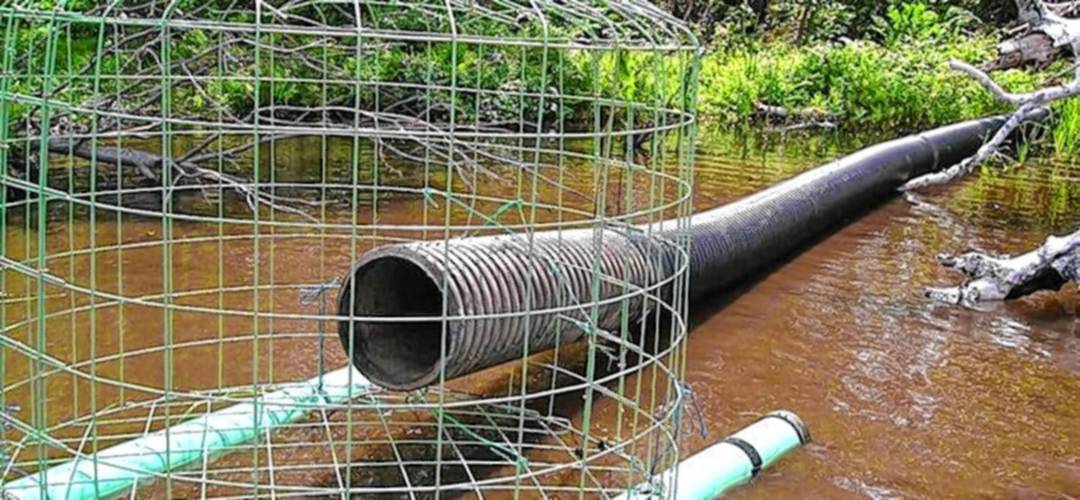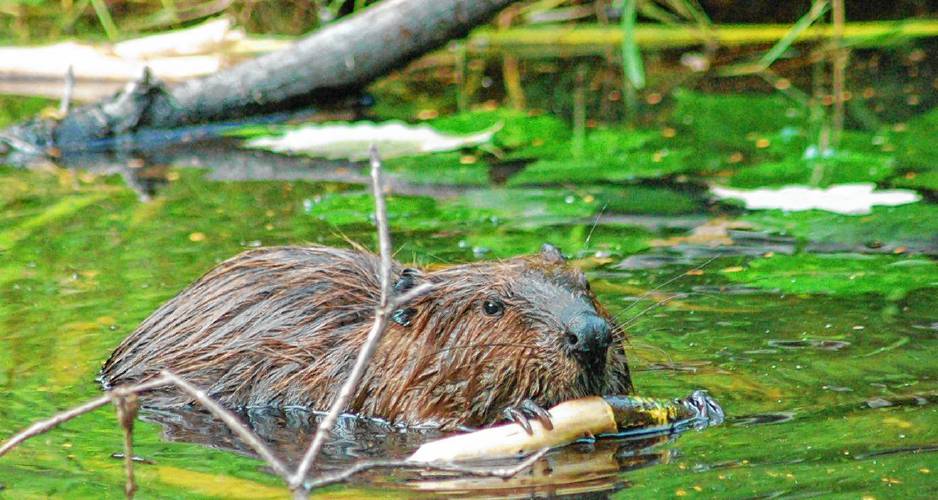City tries ‘beaver deceiver’ to prevent flooding at Mine Falls
| Published: 12-06-2024 1:27 PM |
Mine Falls is one of Nashua’s most treasured landmarks, enjoyed by wildlife and people alike, including sustainability manager Deb Chisholm, who loves seeing beavers while kayaking on the Nashua River.
“If you go out around dusk, then you have a better chance of actually seeing a beaver in the water and when they see you they slap their tail hard on the water. It’s kind of cool when you’re out there and you hear that,” Chisholm said.
“Most of the time people are fine with beavers,” she added. “Typically the only time that beavers become an issue with the city is when there is flooding going on.”
Up until recently, the city’s solution to this problem was to relocate the beavers and poke holes in the dams to reduce the potential for flooding.
“You can relocate beavers to another place, but because that habitat is beneficial to them, beavers are going to come back,” Chisholm said. “The conservation commission had decided that it was interested in trying out some of these tools to see if they were an alternative to simply relocating the beavers.”
Over the past two years, the conservation commission had considered pond levelers – sometimes called “beaver deceivers” – as an alternative method. After deliberation on what location would be best to test one out, a pond leveler was installed at Mine Falls Park near the entrance on Spine Road.
Pond levelers are pipes that run underneath beaver dams that create a permanent leak to keep ponds at a controlled, safe level.
The inlet of the pipe has an exclusion fence that prevents – or “deceives” – beavers from being able to feel or hear the flow of water. Unable to detect the flow, the beavers leave it alone. The height of the outlet of the pipe controls the level of the pond.
Article continues after...
Yesterday's Most Read Articles
 Concord may finally buy long-closed rail line with hopes of creating city-spanning trail
Concord may finally buy long-closed rail line with hopes of creating city-spanning trail
 New Hampshire targets sexual exploitation and human trafficking inside massage parlors
New Hampshire targets sexual exploitation and human trafficking inside massage parlors
 State rules Epsom must pay open-enrollment tuition to other school districts, despite its refraining from the program
State rules Epsom must pay open-enrollment tuition to other school districts, despite its refraining from the program
 New Cheers owners honor restaurant’s original menu while building something fresh
New Cheers owners honor restaurant’s original menu while building something fresh
 Remembered: Friends recall stories about the lives of those who died without housing
Remembered: Friends recall stories about the lives of those who died without housing
 A look ahead at the ‘preferred design’ for Concord’s new police headquarters
A look ahead at the ‘preferred design’ for Concord’s new police headquarters
The city’s first experience with pond levelers was in September 2023 when one was installed at Hassells Brook just two days before a major rain event, after which the leveler was removed.
“It was extensive and probably some of the most flooding that the city has seen in quite some time,” Chisholm said, stating that the city got six inches of rain in just one hour. “Having the pond leveler in Hassells Brook, some people look at it and call it the reason why there was flooding in properties that are bordering Hassells Brook. I personally don’t agree. The flooding was really because of the rainfall and undersized culverts, etcetera.”
The conservation commission had money set aside for beaver management and an existing contract with Bestway Wildlife to install two pond levelers. After the installation and removal of the one at Hassells Brook, there was one left outstanding that the conservation commission wanted to use.
It was considered to install one in the Buckmeadow conservation area on Buckmeadow Drive, but the commission wasn’t ready to install one there yet. Chisholm added that Buckmeadow conservation area has an issue with the overgrowth of phragmites – a type of reed grass – and that phragmites tend to die off when water levels are high.
After the Mine Falls park advisory mentioned how flooding caused by beavers was plugging up the calvert that goes under Spine Road, it was decided that this location would be ideal.
“We really have no local data to sort of indicate whether [pond levelers] work or don’t work,” Chisholm said. “I know there are several communities in Southern New Hampshire that have used them successfully, but we want to be able to use them all here in Nashua before we all of a sudden have a whole bunch of them. We’re just trying to test it out [and] we thought that the Spine Road area would be a good location.”
These articles are being shared by partners in the Granite State News Collaborative. For more information, visit collaborativenh.org.









 ‘A little piece of everything I like’: New Pittsfield barbershop brings more than a haircut to downtown
‘A little piece of everything I like’: New Pittsfield barbershop brings more than a haircut to downtown NH judge decides to pause Trump’s birthright citizenship order
NH judge decides to pause Trump’s birthright citizenship order Canterbury honors ‘real heroes’ with updated Military Veterans’ Project
Canterbury honors ‘real heroes’ with updated Military Veterans’ Project Look, up in the sky! It’s… an Airstream trailer?
Look, up in the sky! It’s… an Airstream trailer?
